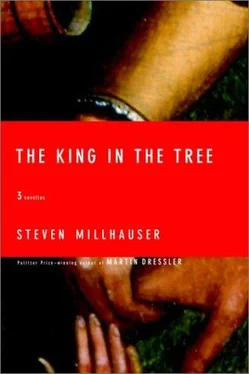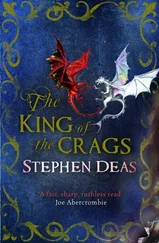He informed the Council that the action was made necessary by charges of misconduct injurious to the reputation of the Queen, the King, and Tristan, and touching upon the honor of his court and kingdom.
With Tristan he was gentle, even tender. Rumors had come to his attention. The Queen’s reputation was at stake. He gazed at Tristan fondly. For a moment I thought his eyes would fill with tears.
The barons friendly to Tristan say the King’s decree is arbitrary and unjust, but they fail to understand the subterrestrial workings of a jealous and fretful mind. When Tristan and the Queen were parading their love, devouring each other with their ardent gazes, the King was unable to act because to act would have been to draw attention to the inadmissible, to display his secret fear. Only now, when the lovers have become circumspect — when, in a sense, it no longer matters — does the decree of banishment become possible.
For my part, I believe it is a mistake the King will learn to regret. With many opportunities for secrecy and solitude, the lovers were able to afford the luxury of discretion. Separation breeds recklessness. Can the King have forgotten Tristan’s talent for adventure, his habit of daring?
Oswin is once again in the King’s good graces.
In the afternoon, the order was given to release Modor from the tower.
The King, fearing some bold stroke by Tristan, has set extra guards at the main gate and the postern and has placed the Queen under the protection of the steward. She is not permitted to be out of Oswin’s sight when the King is absent, unless she is in the women’s quarters. The Queen shuts herself up all day with her women and leaves only to walk in the garden with her handmaid, Brangane. She is cold to Oswin and will not speak to him. She eats little and never laughs.
The rigor of her bearing is unnatural and disturbing, as if only a relentless vigilance over every motion of her body can prevent collapse.
The King rises before dawn and hunts all day. When he returns he consults with Oswin, walks in his garden, seems restless and preoccupied. Sometimes, after the last candle has been put out, after the knights and men-at-arms have retired to their barracks in the courtyard, after the horses are asleep in the stables, I imagine that I can hear, through the stout oak planks of my unbarred door, the King in his chamber, pacing and pacing over the rush-strewn floor.
It is almost daybreak and I am writing quickly. Two visits! — like dreams in the night. Or was I dreaming after all? The first was from the King, who shook me awake. I dressed quickly and followed him across the courtyard and up the winding stairs to his tower chamber. A single candle burned on the table beside the chessboard. He sat down and I sat across from him. For a long time he stared at the pieces, then picked up the white king’s pawn, seemed to hesitate, closed his fist over it, and leaned back, out of the flamelight.
“Have you heard news of Tristan?” he asked, a shade speaking to a shade.
“Nothing, my lord. Is he still in Cornwall?”
“No one knows. The Queen is unhappy.” He paused. “Speak.”
“You’ve tried to find him?”
“No. Yes: of course. Was I unjust to Tristan?”
“There were rumors.”
“There are always rumors. There was no proof.”
“They were much together.”
“By my orders. By predilection. You believe I was unjust.”
“I believe you acted as you found it necessary to act.”
“And if I had asked for your advice?”
“I would have advised you to wait — to watch.”
He looked at me. “Thank you, Thomas.”
The King rose in the dark. “Tristan is true. I would cut off my arm to have him back. If you hear anything—”
“Of course.”
The King started for the door and abruptly returned to the table. I waited for him to speak, but in the light of the candle he silently replaced the white pawn on its starting square.
The King’s visit was not in itself disturbing, for he has long had the habit, when he cannot sleep, of coming to my chamber and inviting me to walk in the garden, or play chess, or follow him through one of the secret passages in the walls of the castle to one of his hidden chambers. What troubled me, as I made my way back across the courtyard, was the knowledge that the exile of Tristan had not put an end to the King’s suffering. What further troubled me, as I climbed the winding stairs to my chamber, was the knowledge that the return of Tristan was also not going to put an end to the King’s suffering. As I approached my door, holding in one hand a candle on an iron stick, I became aware of a movement in the dark. I reached for my sword and heard a single whispered word: “Please.”
In the light of the flame I saw a young woman staring at me with fearful but determined eyes. My surprise was so great that I did not immediately recognize the Queen’s handmaid, Brangane.
I ushered her into my chamber, where she stood stiffly with her hands clasping her elbows and her arms pressed against her stomach. She refused to sit at my writing table or on my clothes chest. For a few awkward moments I stood looking at her with my candle held out before me. Her eyes were darker than the King’s. Coils of hair, visible at the edges of her head covering, were black and shining as the ink in my oxhorn. With a sudden motion of one hand she closed the heavy door behind her. As if in obedience to a sign, I set down the candle on my table and turned to face her in near darkness.
“The Queen sends her greetings,” she began.
“The Queen honors me.”
“The Queen believes you are a just man.”
“The Queen flatters me.”
“The Queen”—she stepped toward me and lowered her voice—“begs for news of Tristan.”
“There is no news.” I stepped back. Had the Queen sent her handmaid to me in a moment of desperation? Or had she detected in me a softness that she wished to explore?
Brangane looked at me as if to take my measure. Abruptly she retreated toward the door, into deeper darkness.
Almost invisible, a black ghost, she breathed forth in a whisper, “I fear for the Queen’s life.” I heard the door opening and listened to her footsteps hurrying away.
Every action is composed of two parts: the outward, visible part, which reveals what the actor wishes us to see, and the inward, invisible part, which is its true meaning. Outwardly, Brangane had come for news of Tristan. But inwardly, did she not have a deeper purpose, the purpose of discovering how far the Queen might go in making use of me? The Queen, emboldened by longing, desperate for news of Tristan, sends her woman to the King’s trusted companion and counselor. She is taking a chance, but not a very great one, for although my allegiance to the King is well known, so is my discretion. It ends with a master stroke: “I fear for the Queen’s life.” That is to say: “If you reveal this visit to the King, you will kill the Queen.” And this: “You can save the Queen’s life by finding Tristan.”
Another thought comes, far more troubling: that my attempts at understanding are superfluous, that the Queen already knows she can rely on me.
Four days have passed since my last entry, and again I am seated at my table late at night. This evening, as usual, I took a walk in the orchard. On my return to the courtyard I stopped not far from the wall of the Queen’s garden, beside the granary. The wall rises to a height of nine feet and is composed of blocks of cut stone secured by mortar and topped by three thousand tiles of many colors. High overhead, in the blue-black night sky, stands the northeast tower, at the top of which is the Queen’s private chamber, where she retires whenever she craves solitude. A dim light shone at the upper window. Was the Queen sitting on her window seat, looking down at her garden? I could see no one from where I stood. I turned my gaze to the northwest tower, where the King and I play chess in the uppermost chamber, above the King’s garden. A dim light shone there too. As I gazed at the two towers, imagining the Queen alone in her chamber, looking down at her garden, and the King alone in his chamber, looking out at the Queen’s tower, I became aware of a nearby sound and stepped back against a wall of the granary.
Читать дальше












